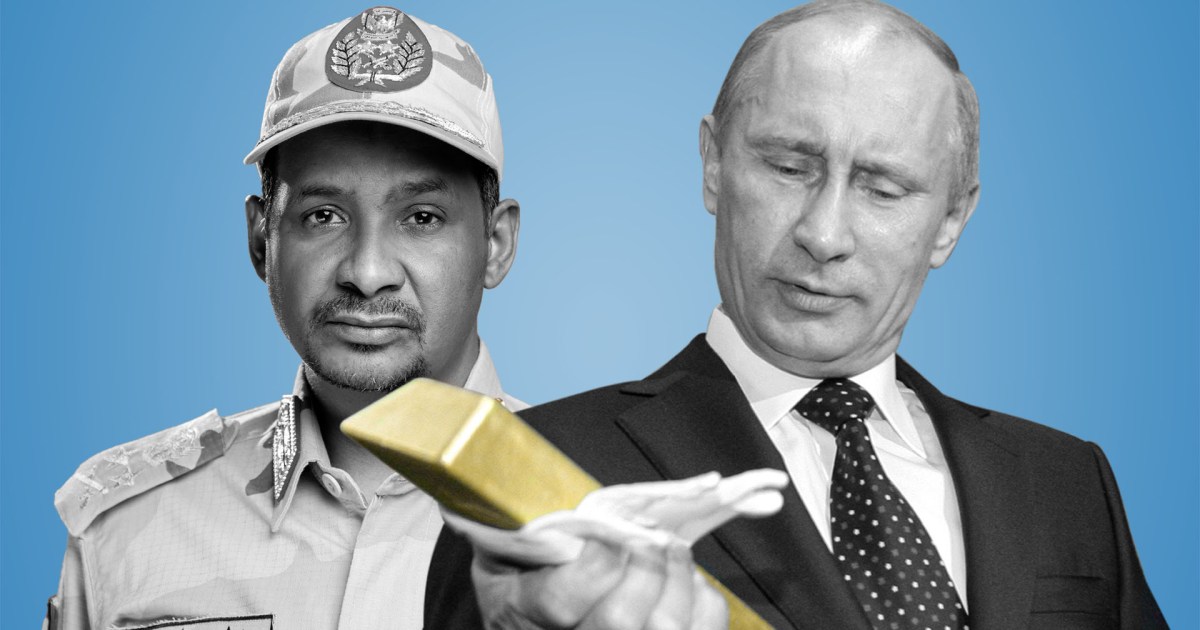Britain's Daily Telegraph reported that Russia has illegally smuggled hundreds of tons of gold from Sudan over the past few years as part of a broader effort to build a "fortress of Russia" and stave off the possibility of increased Ukraine-related sanctions.
In
a report
written by Tom Collins from Nairobi, she explained that the Kremlin has more than quadrupled the amount of gold held in the Russian Central Bank since 2010, creating a "war fund" through a combination of foreign imports and massive domestic gold reserves as the world's third largest producer of the precious metal.
Russia began holding gold more than the US dollar for the first time in June 2020, as bullion accounted for more than 23% of the total reserves, which rose to $630 billion until last February.
Extensive smuggling of gold in Sudan
Official statistics indicate that Sudan exports almost no gold to Russia.
An executive at one of Sudan's largest gold companies told the newspaper that the Kremlin is the largest foreign player in the country's massive mining sector.
He said - on condition of anonymity - that Russia has a lot of operations in Sudanese gold and much of it is smuggled in small planes from military airports spread across the country to Russia.
It is believed that about 30 tons are transported to Russia each year from Sudan, although it is impossible to gauge the true scale of the operation.
Warlord Hemeti
The official in the Sudanese company adds that Russia is allowed to do so because of its links with the Sudanese warlord - who turned into a paramilitary leader - Mohamed Hamdan Dagalo "Hemedti", who became the de facto vice president of the country after the military seizure of power in Sudan last year.
The writer noted that Hemedti traveled to Moscow last week while Russian troops were pouring across the border into Ukraine, in another sign of strengthening bilateral relations between the two countries.
Experts say the Wagner Group is training Hemedti's Rapid Support Forces, a large paramilitary organization that sits alongside Sudan's regular army.
Well-armed Wagner and Rapid Support worked together to secure important gold mines for Russian mining companies in Sudan, where security is poor in remote areas.
Wagner and gold
“One of the things we saw when Russia started deploying its Wagner employees to Sudan was that they were very focused on protecting their mining efforts,” says Sim Tack, co-founder of Force Analysis, a Belgium-based consulting firm that specializes in disputes. gold".
Russian companies, such as M-Invest, which has a local subsidiary called Meroe Gold, started operations in Sudan after former Sudanese President Omar al-Bashir met Vladimir Putin in 2017 and offered him mining concessions. And allow him to build a naval base on the Red Sea.
Another mining company linked to Russia is Kush Exploration and Production, which has been operating in Sudan since 2013. Although these companies are established entities, Tack says, the amount of gold they export to Russia is "completely unknown".
Mining, smuggling and politics
Although M-Invest registered its primary activities as “extracting ores and sands of precious metals,” a CNN investigation found that the company led a disinformation campaign against the 2019 revolution that toppled al-Bashir.
In 2020, the United States said that the company "M-Invest" is owned by the owner of the Wagner Group and served as a cover for the group that is currently waging an "online counter-revolutionary campaign" against a second wave of protests that destabilized Sudan after the military coup last October.
Russia prefers my goodness
During Sudan's brief experiment with democracy, as the government attempted to mend relations with the West after years of crippling sanctions, Russia largely shunned the country's civilian leaders, working instead with Hemedti, who retained power in an uneasy transitional alliance between the military and civilians.
Mining companies' involvement in cyberwarfare mirrors Putin's broader strategy in Africa, where Russian-affiliated entities blur the lines between private security operations and resource extraction.
Tack says that while Sudan is perhaps the most important source of African gold for Russia, it is not the only country on the Kremlin's radar.

